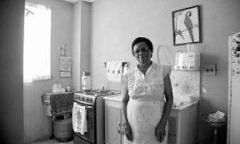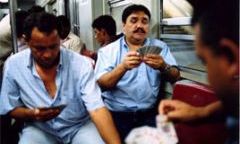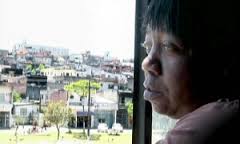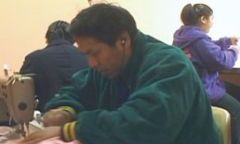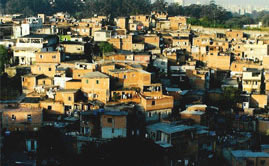Directed by Henri Arraes Gervaiseau, professor at ECA-USP, and produced by CEM. The documentary aims to recover, in a poetic way, the trajectory of the collective members of the Association of Mutirão Paulo Freire, which in the course of ten years built, in a system of self-managed collective effort, in partnership with an NGO, a housing estate for hundred families in Cidade Tiradentes, in the east side of Sao Paulo.
The effect of nonmarket mechanisms in labor market operation
Coordination: Nadya de Araújo Guimarães
Despite the development of a robust sector of labor intermediation aiming at job placement opportunities - a new trend in the Brazilian labor market - our previous research indicated that the ordinary mechanisms proved quite fruitless as a means of fighting inequality and poverty in São Paulo. In contrast, social networks seem to be the way in which ordinary people gain access to employment, in spite of it’s quality.
Thus, the first current focus of the area is to explore the effect of these private non-market mechanisms as major initiatives aimed at raising the chances that an individual has to engage in the labor market. The first module in this line of research investigates the formation and operation of personal networks, making use of new methodological tools (network analysis, rather than surveys as in the previous phase) and intensifying the dialogue with the partners of CMS.
On the other hand, this line of research is also committed to examining the flourishing set of compensatory policies that became a major issue within the Brazilian debate, since 2000, as alternatives to fight against poverty and / or enduring racial inequalities. The purpose of this project is to engage in this discussion by bringing new data on the effectiveness of such initiatives. A second module will evaluate recent affirmative action adopted by prestigious public universities which intend to broaden the occupational chances of blacks and the poor and in order to stimulate their social mobility. International cooperation (with colleagues from the United States, Britain, France and South Africa) will soon allow us to compare the results obtained in Sao Paulo with trends in other major metropolises.
Thus, module 1 explores the personal networks, which have proved effective for succeeding in the job market. From a sample of 1.549 respondents who were looking for a job who had already been interviewed in a representative survey conducted in 2004 in the Metropolitan Region of São Paulo, the project selected a sub-sample of typical cases, for a new round of in depth interviews. The cases are chosen randomly using a typology constructed through the GoM technique (grade of membership). Two interviews are being conducted with each person. The first details the occupational trajectory and identifies the respondent’s sphere of sociability and key people related to these spheres; the second intends to map the network and to link providers of employment with the personal connections.
As in previous phases, the national and international dialogue is still being sought. At the national level, the module compares secondary data (provided by household surveys – PED and PME - held at major cities), analyzing a long series of results related to mechanisms of access to jobs and identifying patterns of variation in different structures of regional labor markets. Internationally, the previous engagement in networks of scientific cooperation provides supports to explore the specificities of Brazilian trends. The dialogue with the Purcell’s research (Koen and Purcell, 2004) on mediation in Europe is supported by the cooperation that has already been established previously by the Department of Sociology at USP, Cebrap and the Institute for Employment Research, University of Warwick.
Concurrently, we are seeking additional exchange with colleagues from Lasma (Institut du Longitudinal, such as Degenne Marry, whose production in the field of networks and integration into the labor market in France is remarkable, as seen in Degenne et al., 1991, and Degenne and Forse, 1994). Gender and age continue to require intellectual attention, and our long-term cooperation with French laboratories at CNRS, such as the GTM (Genre, Travail, Mobilité) or Printemps (Professions, Travail Identités) ensures the continuity of the engagement of Helena Hirata and Didier Démazièere as international partners. This research module also includes national partners from other Brazilian institutions, such as Elisa Reis (Federal University of Rio de Janeiro) and Guilherme Xavier Sobrinho (Statistics Foundation, State of Rio Grande do Sul / FEE).
Module 2 follows the educational performance (tertiary level) and career of people admitted and not admitted in affirmative action programs conducted by two prestigious Brazilian public universities. One of them, in Sao Paulo - nationally recognized - recruits students from all over the country and also provides professionals on a national scale. The second university is recognized regionally and is located in the metropolitan area of Salvador. The project examines three experimental samples: 1) candidates for affirmative action policies that were not admitted; 2) admitted candidates who benefited from affirmative action; and 3) candidates by traditional criteria. The research design follows three steps: i) post-selection trajectory analysis of non-admitted candidates (group 1); ii) comparison of educational performance of groups 2 and 3, using data provided by the institutions, iii) comparison of professional trajectories of groups 1, 2 and 3, based on the interviews. Additional crossed interviews with parents will be held in a sub-sample from groups 1 and 2.
